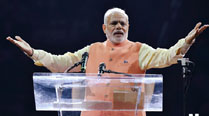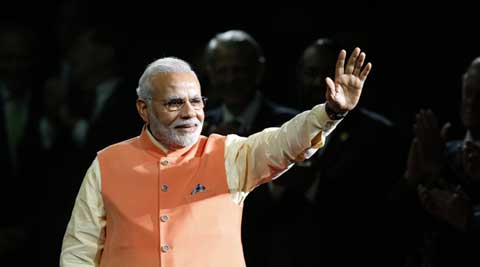Opinion Madison Square Garden cheer wasn’t just for Modi
Indian Americans have come far. Now they must become leaders in the US not just in business, science and engineering, but also in politics and law.

 Just as Japanese Americans gained respect in the US in the aftermath of World War II when Japan became powerful, Indian Americans can expect the same.
Just as Japanese Americans gained respect in the US in the aftermath of World War II when Japan became powerful, Indian Americans can expect the same.
By: Srividhya Ragavan and Raj Dave
Indians are in an exploration phase. Mangalyaan goes to Mars and the prime minister to Washington DC. India has reasons to be ecstatic about the Mars mission, as well as the American visit of its new leader, who will be armed with the glory that a victory with a huge majority in a democracy of one plus billion people befits. For the United States, too, this is an important moment. India is an exemplar in its standing as a functioning democracy of one billion people, especially considering its diversity.
For Indians living in the US, it is time to ask, what does this mean for us? We are a unique community. The Indian diaspora is one of the most economically influential communities in the US. A recent study published by IBNLive reported that as a community, Indian Americans top the US Census charts as comprising the best-educated and highest-paid amongst the 38.1 million foreign-born Americans. Yet we do not have much clout on Capitol Hill to help define the India-US relationship. This is in contrast to other communities, like Jews, whose economic clout also translates into political power, especially regarding American policy towards Israel.
There are about 3.1 million people of Indian origin in the US. It is time for the Indian diaspora to show a strong interest in starting a platform for leaders of second-generation Indian Americans in the US and seeing India-US ties flourish. Such interest is important to ensure Indian Americans become leaders in the US, not just in business, science, medicine and engineering, but also in politics and law, and that negotiations between the two great nations result in policies that impact India positively. Indians in the US should be proud of their origin and they have a duty to ensure that their presence is acknowledged and respected in the US. Indian Americans must promote community interest in the US. Outreach by Indian Americans to India, and by Indian politicians to Indian Americans would be mutually beneficial. Indian-Americans must showcase India’s strategic, political and economic position in South Asia to the US. Just as Japanese Americans gained respect in the US in the aftermath of World War II, when Japan became powerful, Indian Americans can expect the same under present circumstances. As one of the few countries in Asia where the US enjoys a positive image, India remains a friendly country to America.
Indian Americans would do well to take a leaf from the Jewish community’s book. The community has engaged itself in an organised effort to ensure that its interests are well represented. For a Jewish population of 5.3 million in the US, the number of Jewish American politicians is staggering: 10 US senators out of 100; 22 members of the US House of Representatives out of 435; one state governor; five mayors of large cities; and three current Supreme Court justices out of nine.
For the Indian diaspora, this moment is not just to cheer for Prime Minister Modi at Madison Square Garden. Interestingly, Modi’s visit comes at a time when the Ebola virus is weaking havoc and destroying communities and countries faster than any well-trained army. India has been a leader amongst developing countries in ensuring access to medication. That innovation is important has never been refuted but India’s policies define access within the innovation spectrum. Indeed, India’s policies on trade and intellectual property rights can be a trendsetter for developing countries. The discussion on the role of access to innovation will be an important part of the agenda during the prime minister’s visit. Indian Americans should rally to highlight the appropriateness of access as forming a part of the innovation paradigm. Indian Americans should ensure US policies benefit India. What better way than to support the Indian prime minister during his trip to the US?
Ragavan is professor of law, University of Oklahoma College of Law. Davé is a partner in Pillsbury Winthrop Shaw Pittman LLP

